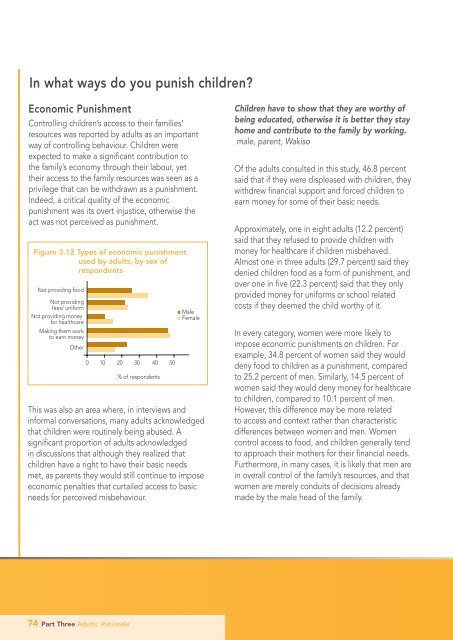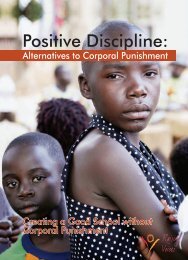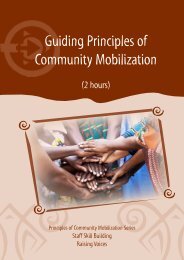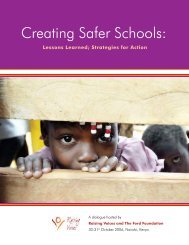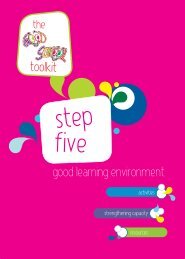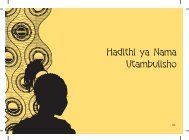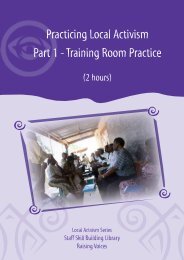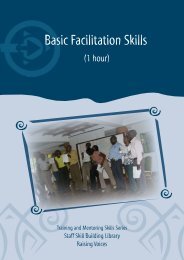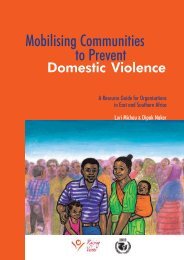Violence against children, the voices of Ugandan ... - Raising Voices
Violence against children, the voices of Ugandan ... - Raising Voices
Violence against children, the voices of Ugandan ... - Raising Voices
Create successful ePaper yourself
Turn your PDF publications into a flip-book with our unique Google optimized e-Paper software.
In what ways do you punish <strong>children</strong>?Economic PunishmentControlling <strong>children</strong>’s access to <strong>the</strong>ir families’resources was reported by adults as an importantway <strong>of</strong> controlling behaviour. Children wereexpected to make a significant contribution to<strong>the</strong> family’s economy through <strong>the</strong>ir labour, yet<strong>the</strong>ir access to <strong>the</strong> family resources was seen as aprivilege that can be withdrawn as a punishment.Indeed, a critical quality <strong>of</strong> <strong>the</strong> economicpunishment was its overt injustice, o<strong>the</strong>rwise <strong>the</strong>act was not perceived as punishment.Figure 3.12 Types <strong>of</strong> economic punishmentused by adults, by sex <strong>of</strong>respondentsNot providing foodNot providingfees/ uniformNot providing moneyfor healthcareMaking <strong>the</strong>m workto earn moneyO<strong>the</strong>r0 10 20 30 40% <strong>of</strong> respondentsMaleFemaleThis was also an area where, in interviews andinformal conversations, many adults acknowledgedthat <strong>children</strong> were routinely being abused. Asignificant proportion <strong>of</strong> adults acknowledgedin discussions that although <strong>the</strong>y realized that<strong>children</strong> have a right to have <strong>the</strong>ir basic needsmet, as parents <strong>the</strong>y would still continue to imposeeconomic penalties that curtailed access to basicneeds for perceived misbehaviour.50Children have to show that <strong>the</strong>y are worthy <strong>of</strong>being educated, o<strong>the</strong>rwise it is better <strong>the</strong>y stayhome and contribute to <strong>the</strong> family by working.male, parent, WakisoOf <strong>the</strong> adults consulted in this study, 46.8 percentsaid that if <strong>the</strong>y were displeased with <strong>children</strong>, <strong>the</strong>ywithdrew financial support and forced <strong>children</strong> toearn money for some <strong>of</strong> <strong>the</strong>ir basic needs.Approximately, one in eight adults (12.2 percent)said that <strong>the</strong>y refused to provide <strong>children</strong> withmoney for healthcare if <strong>children</strong> misbehaved.Almost one in three adults (29.7 percent) said <strong>the</strong>ydenied <strong>children</strong> food as a form <strong>of</strong> punishment, andover one in five (22.3 percent) said that <strong>the</strong>y onlyprovided money for uniforms or school relatedcosts if <strong>the</strong>y deemed <strong>the</strong> child worthy <strong>of</strong> it.In every category, women were more likely toimpose economic punishments on <strong>children</strong>. Forexample, 34.8 percent <strong>of</strong> women said <strong>the</strong>y woulddeny food to <strong>children</strong> as a punishment, comparedto 25.2 percent <strong>of</strong> men. Similarly, 14.5 percent <strong>of</strong>women said <strong>the</strong>y would deny money for healthcareto <strong>children</strong>, compared to 10.1 percent <strong>of</strong> men.However, this difference may be more relatedto access and context ra<strong>the</strong>r than characteristicdifferences between women and men. Womencontrol access to food, and <strong>children</strong> generally tendto approach <strong>the</strong>ir mo<strong>the</strong>rs for <strong>the</strong>ir financial needs.Fur<strong>the</strong>rmore, in many cases, it is likely that men arein overall control <strong>of</strong> <strong>the</strong> family’s resources, and thatwomen are merely conduits <strong>of</strong> decisions alreadymade by <strong>the</strong> male head <strong>of</strong> <strong>the</strong> family.74 Part Three Adults’ Rationale


